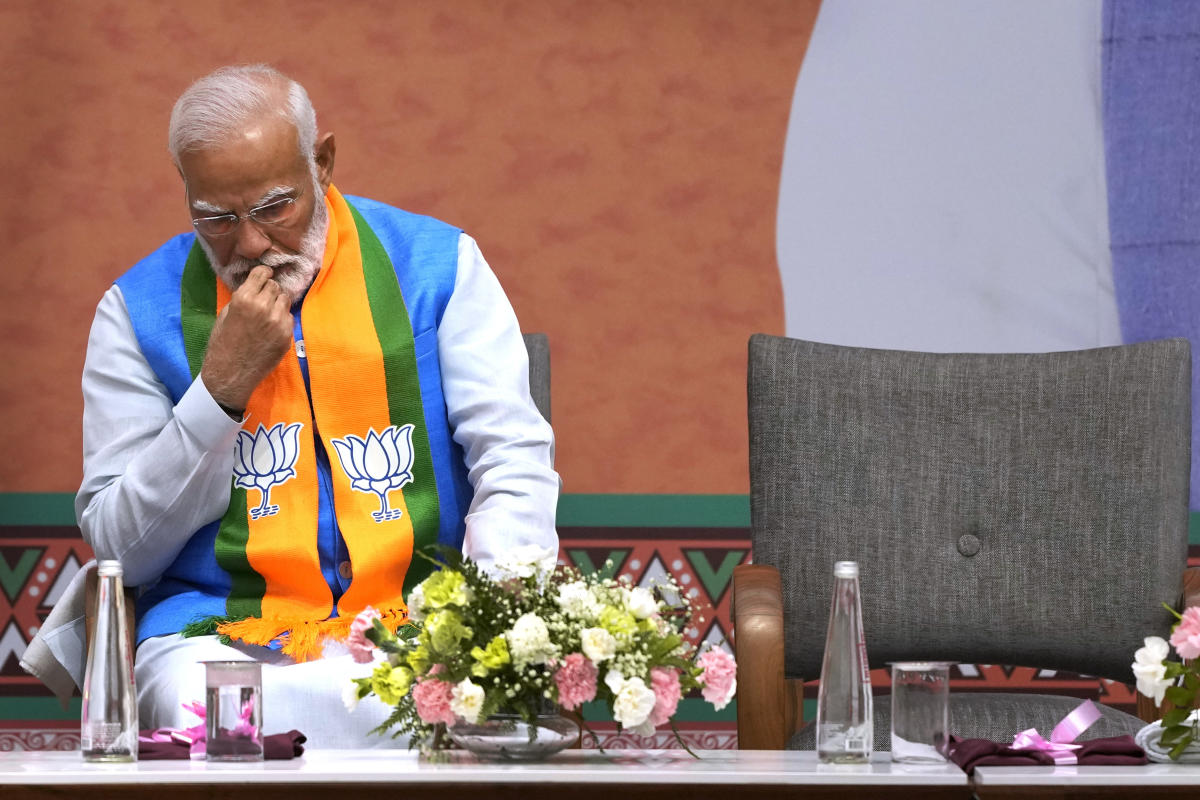BRAND-NEW DELHI (AP) — Given that concerning power a years back, Prime Minister Narendra Modi has actually been understood for huge, strong and frequently snap choices that he’s discovered simple to perform thanks to the brute bulk he enjoyed in India’s lower home of parliament.
In 2016, he pulled over 80% of bank notes from blood circulation in an effort to suppress tax evasion that sent out shockwaves through the nation and ravaged residents who lost cash. In 2019, his federal government pressed through a questionable law that removed the unique status of challenged, Muslim-majority Kashmir with barely any dispute in parliament. And in 2020, Modi quickly generated controversial farming reforms — though he was required to drop those about a year later on after mass demonstrations from farmers.
In his anticipated next term as prime minister — when he will require a union to govern after outcomes revealed Wednesday revealed his Hindu nationalist celebration disappointed a bulk — Modi might need to adjust to a design of governance he has little experience with, or desire for.
And it’s unclear how that will play out.
“Working out and forming a union, dealing with union partners, coming to grips with the tradeoffs that include union politics — none of this suits well with Modi’s brand name of assertive and go-it-alone politics,” stated Michael Kugelman, director of the Wilson Center’s South Asia Institute.
The unexpected election results upended extensive expectations before the vote and exit surveys that recommended a more powerful proving for Modi’s Bharatiya Janata Celebration. In the end, the celebration won 240 seats — except the 272 required to form the federal government by itself. However the union it comes from, the National Democratic Alliance, protected a bulk that must enable Modi to maintain power on the planet’s most populated country.
“India cuts Modi down,” checked out one Indian paper heading on Wednesday, describing the 642 million citizens along with the opposing INDIA alliance, which clawed seats far from the BJP.
This is both a significant obstacle and unidentified area for Modi, who has actually never ever required his union partners to govern considering that very first ending up being prime minister in 2014. It has actually left him the most susceptible he has actually remained in his 23-year political profession.
“These outcomes reveal that the Modi wave has actually declined, exposing a level of electoral vulnerability that lots of might not have actually anticipated,” stated Kugelman.
India has a history of unpleasant union federal governments — however Modi, who has actually taken pleasure in huge appeal, used a reprieve, leading his BJP to landslide success in the last 2 elections. His advocates credit him with changing the nation into an emerging international power, matched by a robust economy that’s the world’s fifth-largest.
That economy, nevertheless, is significantly in problem — and repairing it will now need partners. His challengers concentrated on vulnerabilities in spite of the vigorous development, like joblessness, inflation and inequality — however his project used couple of hints to how he may attend to those.
“Modi barely attended to the concern of joblessness — they skirted around it,” stated Yamini Aiyar, a public law scholar.
It’s not simply that Modi will need to adjust to counting on a union. The election has actually likewise left him reduced after he invested a years constructing a personality of outright invincibility, stated Milan Vaishnav, director of the South Asia Program at the Carnegie Endowment for International Peace.
At the heart of his governance design has actually been his fondness for control, critics state, including that Modi has significantly central power.
Today to remain in power, Modi will need to do whatever he can to preserve a steady union, implying he might need to govern in such a way that is more collective considering that the smaller sized local celebrations in his alliance might make or break his federal government.
The BJP’s dull efficiency is “unquestionably a slap in the face,” Vaishnav stated, of Modi, who with confidence forecasted at his very first election rally in February that the celebration would protect more than 370 seats — 130 more than it did.
The space in between the high expectations Modi and others set for the BJP and its real efficiency has actually left the victors appearing like losers and the beat sensation triumphant.
Still, Vaishnav stated “we shouldn’t lose sight that the BJP is still in the chauffeur’s seat.”
To be sure, his most substantial Hindu nationalist policies and actions are secured — consisting of a questionable citizenship law and Hindu temple developed atop a taken down mosque. His critics and challengers decry those policies, stating they have actually reproduced intolerance and stired spiritual stress versus the nation’s Muslim neighborhood — and left India’s democracy failing, with dissent silenced and the media squeezed.
Now, his program, and capability to press through policies moving forward might deal with fiercer difficulties, specifically from a once deflated and now resurgent opposition.
The INDIA alliance, led by the Congress celebration, will likely have more power to use pressure and press back, specifically in parliament where their numbers will grow.
“Modi is Modi. However I would state that with the mindset with which he ran the nation previously, he will absolutely deal with some issues now,” stated Anand Mohan Singh, a 45-year-old entrepreneur in the capital, New Delhi. “Some modifications will show up.”
___
Associated Press video reporter Shonal Ganguly added to this report.
